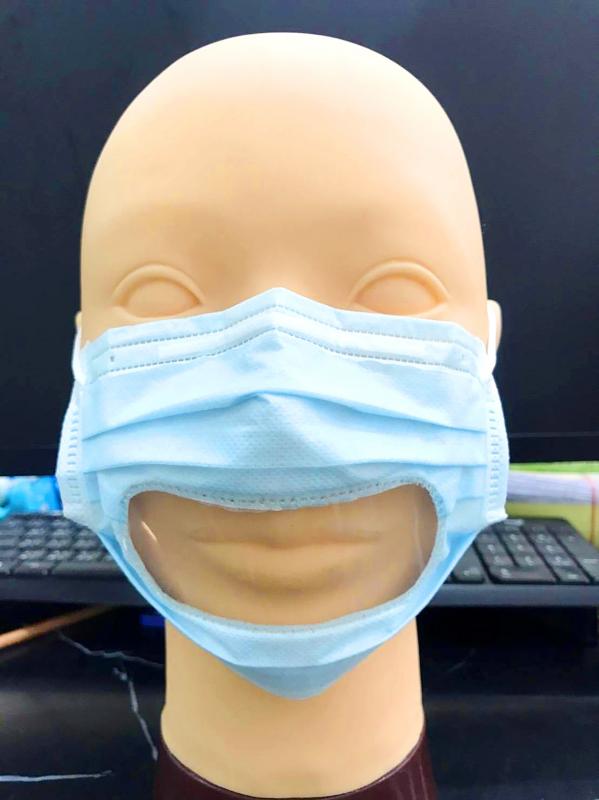Joint efforts are under way to produce masks that are transparent around the mouth to help people who read lips to communicate, as well as for those working in the service industry, a mask producer said yesterday.
The Industrial Development Bureau and the Taiwan Textile Research Institute have designed the new masks after being approached by the nonprofit Dandelion Hearing Association, which works with speech and hearing-impaired people, institute research director Huang Po-hsiung (黃博雄) said.
The only transparent protective face coverings on the market are the face shields worn by people working in the food and beverage industry, he said.

Photo courtesy of Taiwan Textile Research Institute research director Huang Po-hsiung
While shields are useful in preventing the user from spraying droplets onto food, they cannot prevent the spread of viruses, he said.
Association director Hsieh Li-fang (謝莉芳) said that she has been importing transparent masks from Italy at US$7 each.
However, those masks have been found to be largely ineffective in preventing the spread of diseases, Hsieh said.
She approached bureau Deputy Director Wang Li-chu (王麗珠) to inquire about purchasing such masks locally, Hsieh said.
Wang then discussed the issue with Huang and the two resolved to develop a solution, Huang said.
“The crux of the issue in developing [a transparent] mask was ensuring that the seam where the plastic film meets the non-woven fabric blocks viruses,” she said.
The team also had to use a new machine to produce the masks, whose design cost NT$10 million (US$338,501), she said.
The government would subsidize part of the funding to design and produce the masks, but manufacturers had been willing to start working on the products even before subsidies were proposed, which was touching to see, Huang said.
Taiwan Comfort Champ Manufacturing Co (台灣康匠) general manager Chen Yung-chih (陳勇志) said that his factory can manufacture 100 traditional non-woven masks per minute, but added that transparent masks would be produced at a much slower rate, as part of them must be added by hand.
Transparent masks were designed with one-third the differential pressure of conventional medical masks to allow the wearer to breathe comfortably, and they use non-reflective transparent film to facilitate communication, he said.
There are five handmade versions of the mask, and manufacturers hope they will be made for as little NT$8 each once mass production begins, Chen said, adding that the masks are expected to hit the market by the end of this year.
The masks might also be adopted by the service industry to allow for more personal interactions with customers, he said.

Right-wing political scientist Laura Fernandez on Sunday won Costa Rica’s presidential election by a landslide, after promising to crack down on rising violence linked to the cocaine trade. Fernandez’s nearest rival, economist Alvaro Ramos, conceded defeat as results showed the ruling party far exceeding the threshold of 40 percent needed to avoid a runoff. With 94 percent of polling stations counted, the political heir of outgoing Costa Rican President Rodrigo Chaves had captured 48.3 percent of the vote compared with Ramos’ 33.4 percent, the Supreme Electoral Tribunal said. As soon as the first results were announced, members of Fernandez’s Sovereign People’s Party

EMERGING FIELDS: The Chinese president said that the two countries would explore cooperation in green technology, the digital economy and artificial intelligence Chinese President Xi Jinping (習近平) yesterday called for an “equal and orderly multipolar world” in the face of “unilateral bullying,” in an apparent jab at the US. Xi was speaking during talks in Beijing with Uruguayan President Yamandu Orsi, the first South American leader to visit China since US special forces captured then-Venezuelan president Nicolas Maduro last month — an operation that Beijing condemned as a violation of sovereignty. Orsi follows a slew of leaders to have visited China seeking to boost ties with the world’s second-largest economy to hedge against US President Donald Trump’s increasingly unpredictable administration. “The international situation is fraught

MORE RESPONSIBILITY: Draftees would be expected to fight alongside professional soldiers, likely requiring the transformation of some training brigades into combat units The armed forces are to start incorporating new conscripts into combined arms brigades this year to enhance combat readiness, the Executive Yuan’s latest policy report said. The new policy would affect Taiwanese men entering the military for their compulsory service, which was extended to one year under reforms by then-president Tsai Ing-wen (蔡英文) in 2022. The conscripts would be trained to operate machine guns, uncrewed aerial vehicles, anti-tank guided missile launchers and Stinger air defense systems, the report said, adding that the basic training would be lengthened to eight weeks. After basic training, conscripts would be sorted into infantry battalions that would take

GROWING AMBITIONS: The scale and tempo of the operations show that the Strait has become the core theater for China to expand its security interests, the report said Chinese military aircraft incursions around Taiwan have surged nearly 15-fold over the past five years, according to a report released yesterday by the Democratic Progressive Party’s (DPP) Department of China Affairs. Sorties in the Taiwan Strait were previously irregular, totaling 380 in 2020, but have since evolved into routine operations, the report showed. “This demonstrates that the Taiwan Strait has become both the starting point and testing ground for Beijing’s expansionist ambitions,” it said. Driven by military expansionism, China is systematically pursuing actions aimed at altering the regional “status quo,” the department said, adding that Taiwan represents the most critical link in China’s